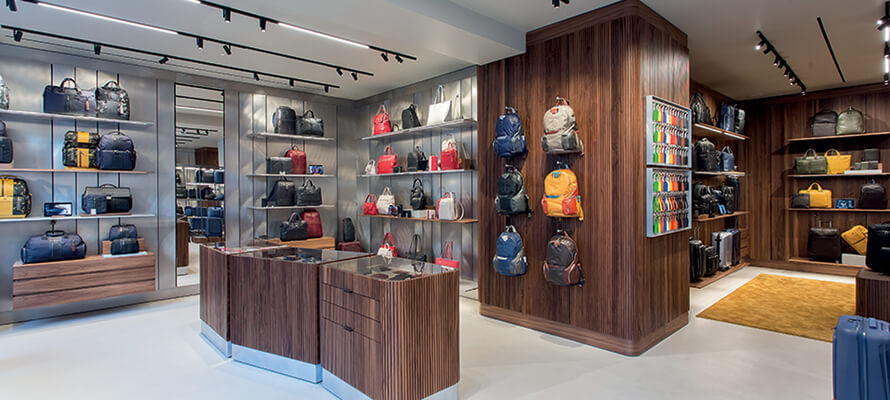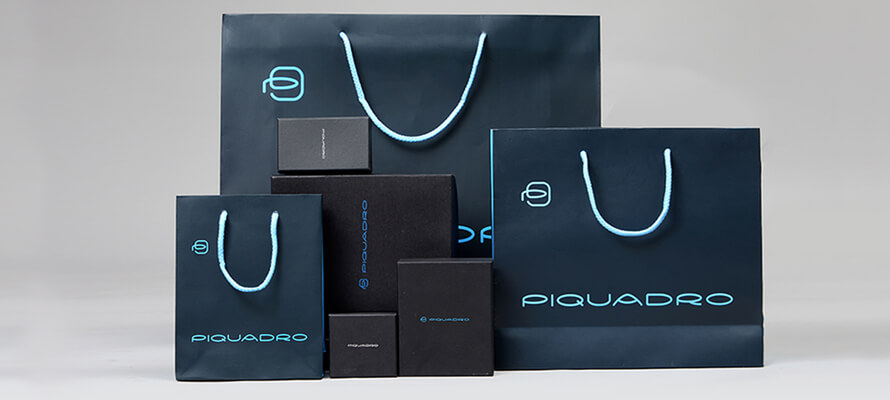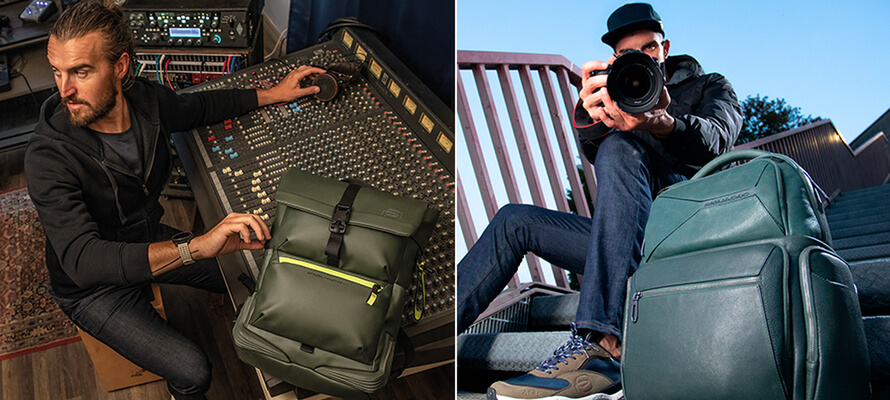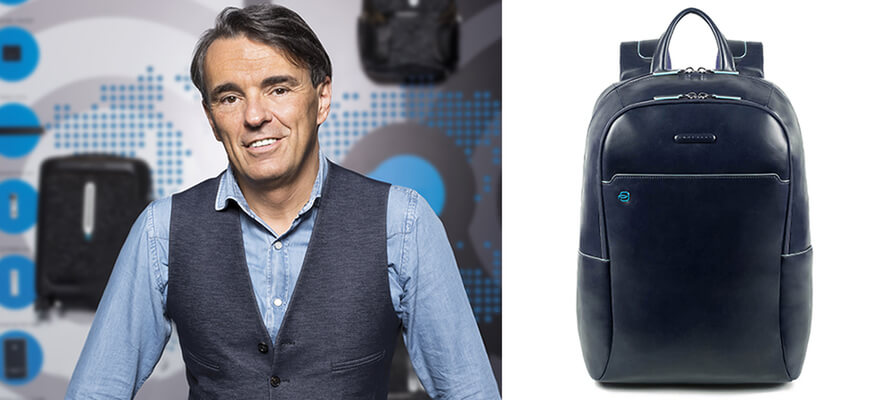Piquadro, Tech (& Sustainable) Inside
The Italian group Piquadro, which also owns the Lancel and The Bridge brands, is constantly searching for innovative solutions not only in product development but also in packaging and printed matter for a premium positioning that makes the values of environmental and social sustainability its trademark.
By Achille Perego | On PRINTlovers 99
When a fashion brand strategically positions itself at the higher end of the market, it looks not only at the content - the products - but also at the container - the packaging. Transmitting an increasingly premium image to the public means having it perceived also by the shopper or the box containing the leather accessories. Piquadro is doing this in a chain that includes the company's marketing choices, graphic design, materials and suppliers - from paper mills to printers. ‘Pi Quadro means P squared, with the P standing for Palmieri (the surname of the founder and current chairman and CEO) and ‘pelletteria’ (leather goods). Specialising in the production of leather goods in the Scandicci district, the company was founded in 1987 in Gaggio Montano, a village in the Tuscan-Emilian Apennines halfway between Bologna and Florence. But in 1998, Marco Palmieri launched his brand after ten years of contract manufacturing for prestigious Italian companies. From the start, Piquadro had a clear vocation for business and travel and was inspired by the values of design, functionality and technology. Focusing on these three values and a constant commitment to research and innovation allows Piquadro to differentiate itself from other brands and become the market leader in Italy in briefcases. The spirit of the products lies in the founding concept behind the design of each one: "Tech Inside", i.e. technology inside the product, is the group's trademark. Because, they say in the company, "technology is the value that makes the difference, even if it is never flaunted but, on the contrary, elegantly hidden and only discovered through daily use". The evolution of the Tech Inside concept is the Bagmotic project that Piquadro has been working on for years. It is an application of IoT (Internet of Things) on bags, a sort of bag automation that allows products equipped with Bagmotic technology to communicate with the person connected via Bluetooth on the smartphone through the Piquadro app available on the App Store and Play Store. It is also possible to manage numerous functions, including a built-in battery that recharges the smartphone by simple contact and a geolocation device that gives an alert in the event of theft or loss.
The products for which Piquadro has consistently been recognised are backpacks. The Bologna-based brand pioneered the business backpack more than 20 years ago with a very innovative advertising campaign. Since then, Piquadro's range of backpacks has expanded. Significant space is now given to 'hybrid' products, equally suitable for work and leisure, meeting the increasingly felt desire for informality and mixing business and leisure. But the real challenge for Piquadro today is the travel segment in which it plans to grow over the next few years by exploiting the know-how and credibility built up in the business travel area. The range is now already developed, with polycarbonate and aluminium lines, produced in a colour palette for all tastes and all types of travel.
The group, which closed its last financial year on 31 March 2023 with revenues from sales in more than 50 countries around the world and in over 175 points of sale and online, up 17.5% to €175.6 million, operates in the leather accessories sector through, as well as Piquadro, the brands The Bridge and Lancel. The cornerstones for the three brands, underlines Palmieri, are attention to detail, craft, and leather quality. The Piquadro product stands out for its innovative design and technological content; The Bridge exalts the vintage flavour of Tuscan craftsmanship, and in Lancel, you find the Parisian allure of a Maison with 150 years of history behind it, acquired by Piquadro in 2018.
Palmieri explains that differentiation also concerns shopping bags and packaging for all three brands. For backpacks, trolleys, briefcases, suitcases and bags, the packaging is limited to the classic cloth that wraps the product at the time of purchase. On the other hand, cardboard boxes of different sizes serve as containers for small leather accessories such as belts, key rings, wallets, iPad cases and pochettes. Each brand has its own reference colours: anthracite with a blue logo for Piquadro, dark brown with a gold logo for The Bridge and red with a white logo for Lancel. This choice is repeated, with some slight variations in the colour of the logos, for the shopping bags which, in the name of sustainability, for some years now have no longer been made of plastic but in FSC and/or recycled paper like the boxes and equipped with a drawstring for transport.
The strategic decision to give Piquadro a more premium image on the market has also led the Bologna-based company to rethink its packaging in recent months. The boxes will have the house colour, dark blue, with the logo in white, using an uncoated paper embossed with UV screen printing, while the shopping bags will see the drawstring abandoned in favour of a blue ribbon. Already planned with samples of the different boxes for small leather goods made in-house, Piquadro is now considering who to entrust these major orders to, both for the purchase of the paper and for converters and printers. There is also news about cardboard for transport packaging and e-commerce, which is modified packaging with recycled Kraft cardboard, again respecting the values of environmental sustainability.
If communication, as for other fashion brands, is favouring digital channels, Piquadro, also due to the request of customers and agents who prefer to show products on printed paper, has not renounced the classic catalogue. In particular, for all three brands, catalogues with continuous products are printed. For Piquadro, it is a matter of two print runs per year of about 3 thousand copies with about ninety pages, which is entrusted to Chinchio Industria Grafica of Rubano in the province of Padua. In the points of sale, on the other hand, banners for the shop windows made of various non-paper materials by Publionda of Trezzo sull'Adda are used, with a constant change according to commercial offers.
The decision to use FSC and/or recycled paper and cardboard for packaging, as well as Kraft packaging, is part of Piquadro's strong focus on sustainability. Moreover, the Bologna-based company has been committed to social responsibility since 2009, the year in which it undertook its first solidarity initiative in support of the local area in collaboration with the Fondazione Famiglia Palmieri, which was created by the chairman of Piquadro and his wife Beatrice to further sustain their philanthropic activities through the enhancement of diversity. During 2020, Piquadro also strongly supported environmental sustainability with a green strategy that, Palmieri explains, "starts with an assessment of the impact of our activities on the environment, reported in the sustainability report that is drawn up regularly. In the name of environmental protection, the use of recycled materials and the control of the supply chain are required, but also the pursuit of energy efficiency, the reduction of emissions and the use of natural resources, as well as actions supporting the local area". Crucial for Piquadro's chairman was the decision to introduce and gradually expand product lines made with environmentally friendly materials - 100% recycled nylon obtained from industrial waste. At the same time, work has been done on the sustainability of leather products, guaranteeing that raw materials come from increasingly responsible farms and tanneries and favouring suppliers certified by the Leather Working Group (LWG). This independent international body has developed the world's most widespread sustainability protocol for the leather supply chain. Then, in September 2022, the company took a new, decisive step in its sustainability journey by announcing carbon neutrality for the entire group.
“Companies making environmental, social and ethical sustainability a value will be increasingly rewarded,” Palmieri concludes. “And this value should increasingly be taken as an indicator for product evaluation. This means that behind a Piquadro, Lancel or The Bridge trolley or bag, there is a strong focus on the environment in the research of materials and production to increasingly reduce their carbon footprint. And this is what we do by 'injecting' the sustainability virus into our company. I believe that in the future, more and more consumer choices will be influenced not only by the fact that a product is beautiful and performs well and is therefore purchasable for its value for money but also for its ethical content, which is represented by ESG values.” Values that are also passed on through printed products.






